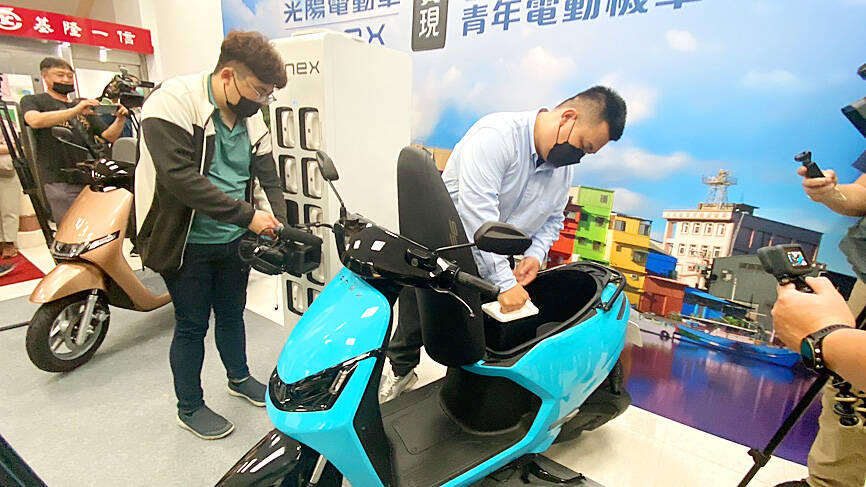Kwang Yang Motor Co (光陽工業), a major manufacturer primarily of gasoline-powered scooters under the KYMCO brand, has pledged to invest NT$4.4 billion (US$142.4 million) in the research and manufacture of electric scooters and battery packs as well as the establishment of electrified infrastructure for sales of electric scooters in Taiwan, the Ministry of Economic Affairs said on Friday.
The InvesTaiwan Service Center on Friday approved the Kaohsiung-based company’s application to participate in the government’s incentive program, the ministry said.
The announcement comes as Kwang Yang is building a business model for the construction of an ecosystem for electric scooters, battery packs and battery-swapping stations around the nation, it said.

Photo: Lu Hsien-hsiu, Taipei Times
Eventually, the company hopes to provide comprehensive electric scooter solutions for individuals, enterprises and government agencies, it added.
Kwang Yang has achieved its goal of setting up 2,600 battery-swapping stations this year, which cover more than 80 percent of Taiwan’s administrative regions and make the company the largest provider of battery-swapping stations in the nation, the ministry said.
In addition, the company plans to carry out research on the reuse of old batteries and their recycling as part of its efforts to achieve its social responsibility and sustainability goals, it said.
InvesTaiwan also on Friday approved plans by three other companies, including machine tool maker Parkson Wu Industrial Co (寶嘉誠工業) and sheet metal processing provider Taiwa Precise Technique Co (台華精技), to establish or expand their manufacturing facilities in the nation, the ministry said.
The “Invest in Taiwan” initiative has to date attracted 1,377 companies to invest more than NT$2.08 trillion in Taiwan, with 10 applications pending review, it said.
The investment figure is expected to reach NT$2.2 trillion by the end of the year, Premier Chen Chien-jen (陳建仁) said on Saturday while attending an investment conference focusing on the private sector’s participation in public construction projects.

Sweeping policy changes under US Secretary of Health and Human Services Robert F. Kennedy Jr are having a chilling effect on vaccine makers as anti-vaccine rhetoric has turned into concrete changes in inoculation schedules and recommendations, investors and executives said. The administration of US President Donald Trump has in the past year upended vaccine recommendations, with the country last month ending its longstanding guidance that all children receive inoculations against flu, hepatitis A and other diseases. The unprecedented changes have led to diminished vaccine usage, hurt the investment case for some biotechs, and created a drag that would likely dent revenues and

Macronix International Co (旺宏), the world’s biggest NOR flash memory supplier, yesterday said it would spend NT$22 billion (US$699.1 million) on capacity expansion this year to increase its production of mid-to-low-density memory chips as the world’s major memorychip suppliers are phasing out the market. The company said its planned capital expenditures are about 11 times higher than the NT$1.8 billion it spent on new facilities and equipment last year. A majority of this year’s outlay would be allocated to step up capacity of multi-level cell (MLC) NAND flash memory chips, which are used in embedded multimedia cards (eMMC), a managed

CULPRITS: Factors that affected the slip included falling global crude oil prices, wait-and-see consumer attitudes due to US tariffs and a different Lunar New Year holiday schedule Taiwan’s retail sales ended a nine-year growth streak last year, slipping 0.2 percent from a year earlier as uncertainty over US tariff policies affected demand for durable goods, data released on Friday by the Ministry of Economic Affairs showed. Last year’s retail sales totaled NT$4.84 trillion (US$153.27 billion), down about NT$9.5 billion, or 0.2 percent, from 2024. Despite the decline, the figure was still the second-highest annual sales total on record. Ministry statistics department deputy head Chen Yu-fang (陳玉芳) said sales of cars, motorcycles and related products, which accounted for 17.4 percent of total retail rales last year, fell NT$68.1 billion, or

In the wake of strong global demand for AI applications, Taiwan’s export-oriented economy accelerated with the composite index of economic indicators flashing the first “red” light in December for one year, indicating the economy is in booming mode, the National Development Council (NDC) said yesterday. Moreover, the index of leading indicators, which gauges the potential state of the economy over the next six months, also moved higher in December amid growing optimism over the outlook, the NDC said. In December, the index of economic indicators rose one point from a month earlier to 38, at the lower end of the “red” light.